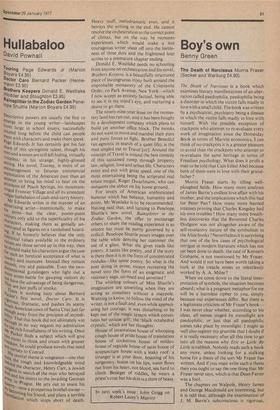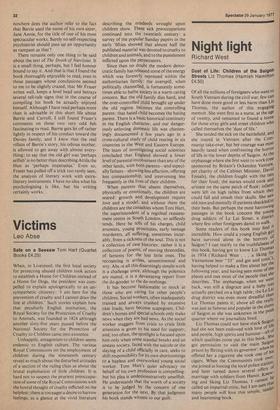Boy's own
Benny Green
The Death of Narcissus Morris Fraser (Secker and Warburg £4.90) The Death of Narcissus is a book which examines literary manifestations of an aberration called paedophilia, paedophilia being ,a disorder in which the victim falls madly in love with a small child. The book was written by a psychiatrist, psychiatry being a disease in which the victim falls madly in love with himself. With the possible exception of crackpots who attempt to re-evaluate every work of imagination since the Domesday Book in terms of Marxist economics, I can think of no crackpots it is a greater pleasure to avoid than the crackpots who attempt to re-evaluate the same heritage in terms of Freudian psychology. What does it profit a man to be told that Cain killed Abel because both of them were in love with their grandfather?
Morris Fraser starts by tilling wellploughed fields. How many more analyses of James Barrie's endless love affair with his mother, and the implications which this had for Peter Pan ? How many more learned treatises proving that Charles Kingsley had his own troubles? How many more breathless discoveries that the Reverend Charles Dodgson was not altogether aware of the self-revelatory nature of the symbolism in the Alice books? Nevertheless it is surprising that one of the few cases of psychological intrigue in modern literature which has not yet been done to death, the case of Kenneth Grahame, is not mentioned by Mr Fraser. And would it not have been worth taking a look at the treacle mines so relentlessly worked by A. A. Milne?
When we come down to the literal interpretation of symbols, the situation becomes absurd; what is a pregnant metaphor for me will be a harmless cipher to you, simply because our experiences differ. But there is a legitimate criticism of Mr Fraser's book! was never clear whether, according to his ideas, all scenes staged by moonlight are paedophilic, or just that all paedophilic scenes take place by moonlight. I might as well also register my grumble that I doubt if it is really necessary after all this time to go into all the reasons why Eric or Little By Little is rubbish. Nobody reads such a book any more, unless looking for a stalking horse for a thesis of the sort Mr Fraser has written. And if you must write suchsa thesis then you ought to say the one thing that Mr Fraser never says, which is that Dean Farrer was a fool.
The chapters on Walpole, Henry James. and George Macdonald are interesting, but it is odd that, although the examination of J. M. Barrie's subconscious is rigorous,
nowhere does the author refer to the fact that Barrie used the name of his own sister, Jane Annie, for the title of one of his most spectacular works. Surely no self-respecting psychiatrist should pass up an opportunity as rampant as that ?
There remains only one thing to be said about the text of The Death of Narcissus. It is a small thing, perhaps, but I feel honour bound to say it. And that is that I found the book thoroughly enjoyable to read, even in those passages whose conclusions seemed to me to be slightly crazed, that Mr Fraser writes well, keeps a level head and betrays several tell-tale signs that in the course of compiling his book he actually enjoyed himself. Although I have read perhaps more than is advisable in this short life about Barrie and Carroll, I still found Fraser's comments on those two very odd fish fascinating to read. Barrie gets let off rather lightly in respect of his conduct toward the Davies family, and I know that the real villain of Barrie's story, his odious mother, is allowed to get away with almost everything; to say that the old girl was `perhaps selfish'is no better than describing Attila the Hun as 'perhaps impetuous.' Even so, Fraser has pulled off a trick too rarely seen, the analysis of literary work with extraliterary instruments. I have no idea what his psychologising is like, but his writing certainly works.











































 Previous page
Previous page